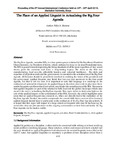The Place of an Applied Linguist in Actualising the Big Four Agenda
Abstract
The Big Four Agenda, hereafter BFA, is a four-point agenda initiated by His Excellency President Uhuru Kenyatta, the President of Kenya, which outlines his focus in his final Presidential term. The BFA is geared towards improving the living standards of all Kenyans regardless of their social status; grow the economy and leave a long-lasting legacy. The items in the BFA are; manufacturing, food security, affordable housing and universal healthcare. The skills and expertise of all professionals and the government are essential in the actualisation of the Big Four Agenda. All Kenyans should be proactively involved in realising the vision of the president and his government. Applied linguists may think that they are just spectators in the four-point Agenda, but that is not the case. It is important to note that language is a roadmap in the realisation of national development. An applied linguist, therefore, has a role to play since there maybe linguistics problems that if not solved, may hinder the actualisation of the BFA. This means that applied linguists are part of the solution to both local and the global challenges which may stand in the way of actualising the Big Four Agenda. This paper strives to shed some light on the role of the applied linguist in the actualisation of the BFA. Secondly, the article highlights some areas that an applied linguist may research on, which are directly tied to the realisation of the Big Four Agenda. Further, the article compounds the crucial skills that a current (21st Century) applied linguist should have to participate in the realisation of the Big Four Agenda actively. It is hoped that this paper will impact to a large extent on Linguists who may be harbouring the notion that they are just spectators in the ongoing conversation on how best and timely the Big Four Agenda can be made a reality.

